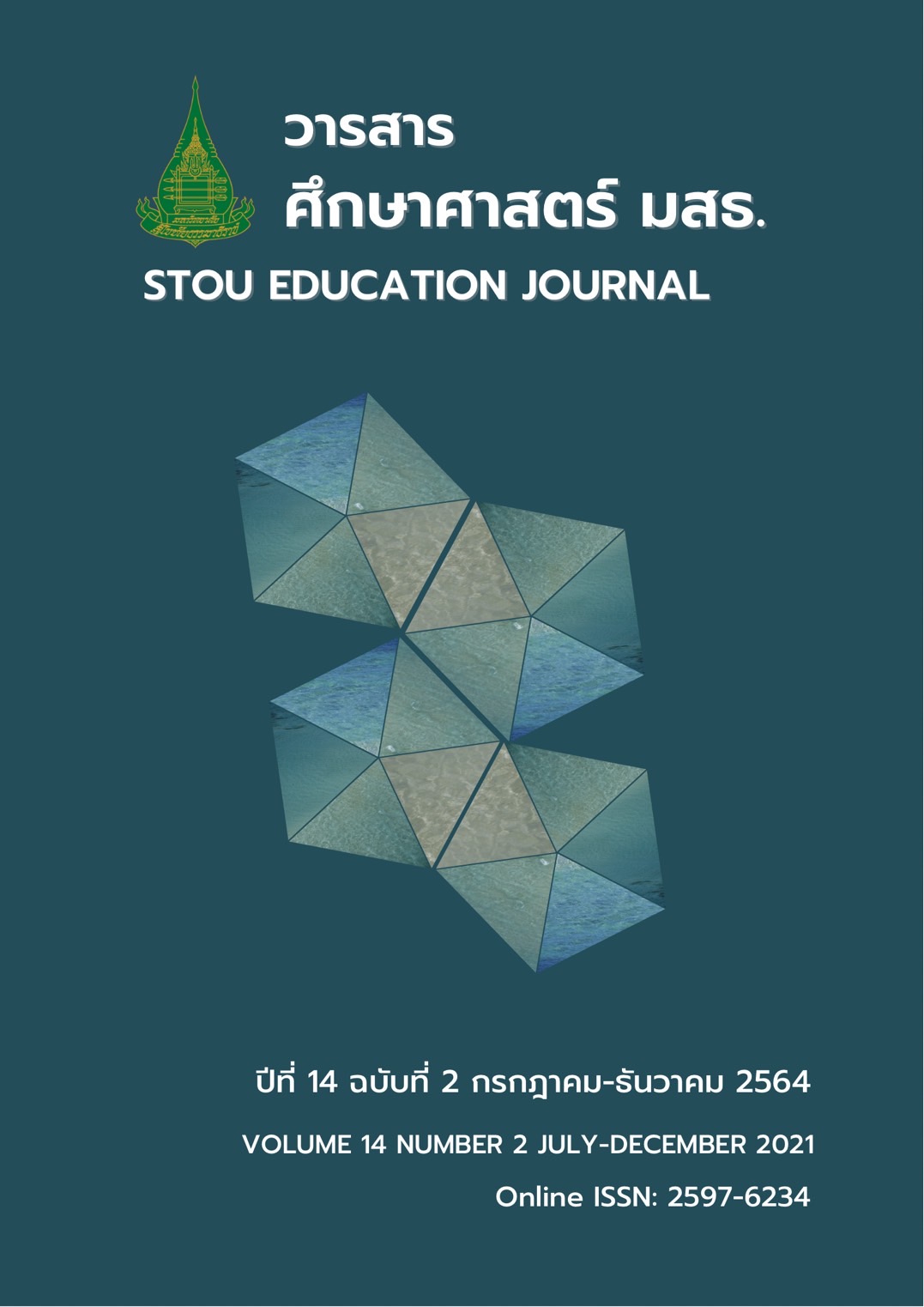การสังเคราะห์ความหมาย องค์ประกอบ และตัวบ่งชี้ ของความเป็นพลเมืองวิทยาศาสตร์
Main Article Content
บทคัดย่อ
การวิจัยนี้มีวัตถุประสงค์เพื่อ 1) สังเคราะห์ความหมาย องค์ประกอบ และตัวบ่งชี้ความเป็นพลเมืองวิทยาศาสตร์ และ 2) ตรวจสอบความเหมาะสมของความหมาย องค์ประกอบ และตัวบ่งชี้ความเป็นพลเมืองวิทยาศาสตร์ โดยทำการวิจัยด้วยวิธีการวิเคราะห์เอกสาร ช่วง พ.ศ. 2543 ถึง 2563 และการสัมภาษณ์กึ่งโครงสร้างจากผู้เชี่ยวชาญ 5 คน แล้วทำการสังเคราะห์ความหมาย องค์ประกอบ และตัวบ่งชี้ความเป็นพลเมืองวิทยาศาสตร์ จากนั้นให้ผู้เชี่ยวชาญตรวจสอบความเหมาะสมของผลการศึกษาโดยใช้แบบประเมินความเหมาะสม และปรับปรุงตามคำแนะนำของผู้เชี่ยวชาญ วิเคราะห์ข้อมูลโดยใช้การวิเคราะห์เนื้อหา ผลการศึกษา พบว่า 1) ความเป็นพลเมืองวิทยาศาสตร์ หมายถึง บุคคลที่มีความรู้วิทยาศาสตร์ ทักษะทางวิทยาศาสตร์ และเข้าใจธรรมชาติของวิทยาศาสตร์ สามารถประยุกต์ใช้ความรู้ทางวิทยาศาสตร์เป็นฐานในการดำรงชีวิต และแสดงจุดยืนของตนเองในสังคมได้อย่างมีเหตุผล มีองค์ประกอบ 3 ด้าน 7 ตัวบ่งชี้ ได้แก่ องค์ประกอบด้านบุคคล หมายถึง บุคคลต้องมีความรู้พื้นฐานวิทยาศาสตร์และความรู้วิทยาศาสตร์ร่วมสมัย มี 3 ตัวบ่งชี้ คือ ความรู้พื้นฐานวิทยาศาสตร์ กระบวนการสืบเสาะหาความรู้ทางวิทยาศาสตร์ และจิตวิทยาศาสตร์ องค์ประกอบด้านปฏิสัมพันธ์ในสังคม หมายถึง บุคคลต้องทำงานร่วมกับผู้อื่น มีการโต้แย้งเชิงวิทยาศาสตร์และตัดสินใจบนพื้นฐานของความรู้วิทยาศาสตร์ ข้อมูล ข่าวสาร เพื่อแก้ปัญหาการอยู่ร่วมกันในสังคมที่เกี่ยวข้องกับวิทยาศาสตร์ มี 2 ตัวบ่งชี้ คือ ความสามารถในการโต้แย้งเชิงวิทยาศาสตร์ และความสามารถในการตัดสินใจ องค์ประกอบด้านความตระหนักต่อสังคม หมายถึง บุคคลจะต้องตระหนักในตนเองทั้งความคิด การตัดสินใจ และการปฏิบัติตนในสังคมที่เกี่ยวข้องกับวิทยาศาสตร์ มี 2 ตัวบ่งชี้ คือ การตระหนักในตัวบุคคล และการตระหนักต่อส่วนรวมตามหน้าที่ในสังคม และ 2) ผลการตรวจสอบความเหมาะสมความหมาย องค์ประกอบ และตัวบ่งชี้ความเป็นพลเมืองวิทยาศาสตร์จากผู้เชี่ยวชาญอยู่ในระดับเหมาะสมมากที่สุด มีค่าเฉลี่ยเท่ากับ 4.58
Article Details
เอกสารอ้างอิง
ชัยอนันต์ สมุทวณิช. (2542). ประชารัฐกับการเปลี่ยนแปลง. กรุงเทพฯ: สถาบันนโยบายศึกษา.
บุญชม ศรีสะอาด. (2554). การวิจัยสำหรับครู (พิมพ์ครั้งที่ 3). กรุงเทพฯ: สุวิริยาสาส์นบุญชมศรี.
สำนักงานเลขาธิการสภาการศึกษา. (2554). ยุทธศาสตร์พัฒนาการศึกษาเพื่อสร้างความเป็นพลเมือง พ.ศ. 2553-2561 (พิมพ์ครั้งที่ 4). กรุงเทพฯ: สำนักนโยบายด้านพัฒนาคุณภาพและมาตรฐานการศึกษา สำนักงานเลขาธิการสภาการศึกษา กระทรวงศึกษาธิการ.
สำนักงานเลขาธิการสภาการศึกษา. (2557). โครงการวิจัยเรื่องการกำหนดแนวทางการพัฒนาการศึกษาไทยกับการเตรียมความพร้อมสู่ศตวรรษที่ 21. กรุงเทพฯ: สำนักนโยบายด้านพัฒนาคุณภาพและมาตรฐานการศึกษา สำนักงานเลขาธิการสภาการศึกษา กระทรวงศึกษาธิการ.
สำนักงานเลขาธิการสภาการศึกษา (2559). รายงานการวิจัยเพื่อจัดทำข้อเสนอเชิงนโยบายการพัฒนาการศึกษาเพื่อสร้างความเป็นพลเมือง. กรุงเทพฯ: สำนักนโยบายด้านพัฒนาคุณภาพและมาตรฐานการศึกษา สำนักงานเลขาธิการสภาการศึกษา กระทรวงศึกษาธิการ.
สำนักงานเลขาธิการสภาการศึกษา (2561). รายงานวิจัย ข้อเสนอตัวชี้วัดการศึกษาเพื่อความเป็นพลเมืองโลก ตามกรอบเป้าหมายการพัฒนาที่ยั่งยืน (Sustainable Development Goal : SDG 4.7): กรณีศึกษาแนวทางการส่งเสริมความเป็นพลเมืองโลก (Global Citizenship) ประสบการณ์นานาชาติ. กรุงเทพฯ: สำนักวิจัยและพัฒนาการศึกษา สำนักงานเลขาธิการสภาการศึกษา กระทรวงศึกษาธิการ.
สำนักงานเลขาธิการสภาการศึกษา (2562). แนวทางการพัฒนาสมรรถนะผู้เรียนระดับการศึกษาขั้นพื้นฐาน. กรุงเทพฯ: บริษัท 21 เซ็นจูรี่ จำกัด.
DePace, A. (2020). The scientific citizenship initiative. Cambridge: Harvard Medical School Press.
Barrue, C. & Albe, V. (2013). Citizenship education and socioscientific issues: Implicit concept of citizenship in the curriculum, views of French Middle School Teachers. Science & Education. 22, 1089–1114.
Bayram-Jacobs, D., Wieske, G., & Henze, I. (2019). A chemistry lesson for citizenship: Students’ use of different perspectives in decision-making about the use and sale of laughing gas. Education Science, 100(9), 1-16.
Blanco-Lopez, A., Espana-Ramos, E., Gonzalez-Garcia, F. J., & Franco-Mariscal, A. J. (2014). Key aspects of scientific competence for citizenship: A delphi study of the expert community in spain. Journal of Research in Science Teaching, 52(2), 164-198.
Burns, T.W., O’Connor, D. J., & Stocklmayer, S.M. (2003). Science communication: A contemporary definition. Public Understanding of Science, 12(2), 183–202.
Bybee, R., McCrae, B., & Laurie, R. (2009). PISA 2006: An assessment of scientific literacy. Journal of Research in Science Teaching, 46(8), 865–883.
Center for Civic Education. (2010). National standards for civics and government. Woodland Hills, Ca: Author.
Davies, I. (2004). Science and citizenship education. International Journal of Science Education, 26(14), 1751-1763.
DeBoer, G. (2011). The globalization of science education. Journal of Research in Science Teaching, 48(6), 567–591.
Eurydice. (2012). Citizenship education in Europe. Brussels: education, Audiovisual and Culture Executive Agency.
European Union (EU). (2016). Framework for the key citizenship competences. Official Journal of the European Union: Publications Office of the European Union.
Fensham, P. (2007). Competences, from within and without: new challenges and possibilities for scientific literacy. In Proceedings of the Linnaeus Tercentenary Symposium held at Uppsala University (pp. 113–119). Sweden: Uppsala University.
Fensham, P. (2009). Real world contexts in PISA Science: Implications for context-based science education. Journal or Research in Science Teaching, 46(8), 884–896.
Irwin, A. (2015). Citizen science and scientific citizenship .Retrieved form .https://povesham.wordpress.com/2016/02/02/alan-irwin-talk-on-citizen-science-and-scientific-citizenship-jrc-october-2015/
Kekkonen, S. (2007). Programme management within The Finnish Government: Prime
Minister’s Office Publications 12/2007. Helsinki: Prime Minister´s Office.
Kubow, P. K., Grossman, D., & Ninomiya, A. (1998). Citizenship for the 21st century: An international perspective on education . London: Kogan Page.
MCEETYA. (2008). Melbourne declaratin on educational goals for Young Australians. Melbourne, Australia: Ministerial Council on Education, Employment, Training and Youth Affairs (MCEETYA).
Ministry of Education. (2014). 2014 Syllabus character and citizenship education secondary. Singapore: Ministry of Education.
NGSS Lead States. (2013). Next generation science standards: For States, By States. Achieve, Inc. on behalf of the twenty-six states and partners that collaborated on the NGSS. Retrieved form: www.nextgenscience.org/ .
Ong, A. (1999). Flexible citizenship: The cultural logics of transnationality. Durham: Duke University Press.
Organisation for Economic Cooperation and Development (OECD). (2006). Assessing scientific, reading and mathematical literacy.At Framework forPISA 2006 . Retrieved form http://www.oecd-ilibrary.org/education/assessing-scientific-reading-and-mathematicalliteracy_9789264026407-en.
Osborne, J. (2000). Good practice in science teaching: What research has to say. Buckingham: Open University Press.
Petryna, Adriana. (2002). Life exposed: Biological citizens after chernobyl. Princeton: Princeton University Press.
Ratcliffe, M., Grace, M. (2003). Science education for citizenship: Teaching socio-scientific issues. Maidenhead, UK: McGraw-Hill Education.
Sternsdorff-Cisterna, N. (2015). Food after Fukushima: Risk and scientific citizenship in Japan. American Anthropologist, 117(3), 455-467.
Ten Dam, G. & Volman, M. (2004). Critical thinking as a citizenship competence: Teaching strategies. Learning and Instruction, 30, 359–379.
UNESCO, (2015). Global citizenship education. France: The United Nations Educational, Scientific and Cultural Organization.
Varis, K., Jäppinen, I., Kärkkäinen, S., Keinonen, T., & Väyrynen, E. (2018). Promoting participation in society through science education. Sustainability, 3412(10); 1-16.
Wellington, J. (2003). Science education for citizenship and a sustainable future. Pastoral Care in Education, 21 (3), 2-37.


